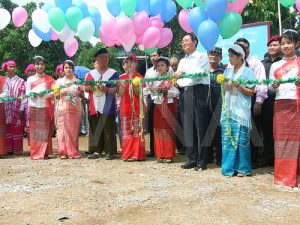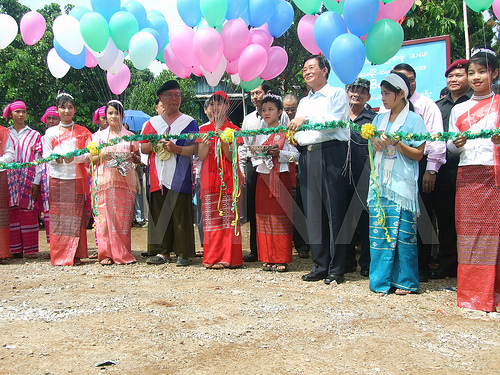Thu-Rain – At 8:30 am on May 15th, 2012, about 400 people including Three Pagodas Pass (TPP) residents, local ethnic people, and officials of invited delegations attended the opening ceremony for the Karen National Union (KNU) liaison office in Ward 3 of the TPP border town.

The opening ceremony of KNU liaison office started at 9 am with five ceremonial agendas – starting the ceremony, a speech by Union Railway Transportation Minister U Aung Min, a speech by the Chief of Staff of the KNU and its military wing KNLA General Mutu Say Phoe, the General cutting the ceremonial ribbon to open the liaison office, and announcing the conclusion of the ceremony.
Union Minister U Aung Min said that peace negotiations have been attempted since the era of the military government, but political conditions either prevented the peace process from progressing or wrecked it entirely. Now, he felt glad that genuine peace could be realized in the era of the Republic of the Union of Myanmar thanks to equality among ethnic majorities and minorities.
The Union Minister continued that the economy was the key factor for developing the country, and that economic development could be realized only once the country is stable. The main objective for improving the domestic, international and cross-border trade is the construction of roads. The former “Death Railway” between Three Pagodas Pass and Thanphyuzayart, currently used as a motorway, will be renovated as a functioning railroad with a new motorway constructed by the government. The Chief Ministers of Mon and Karen States must jointly manage the border industrial zone because Three Pagodas Pass is primarily inhabited by Mon and Karen people, and local business people should support peace and economic initiatives.
General Mutu Say Phoe, the KNU and KNLA Chief of Staff, said that he felt happy that the peace process with the government has been developing successfully. He explained that ethnic animosity toward the Burmese started during World War II and intensified a year after Burma’s independence due to brutal killings between Karen and Burmese in the Phyar Pon region of the Irrawaddy Delta. Hostilities, fueled by ethnic conflicts and political problems, broke out for nearly 63 years. Eventually, after the Republic of the Union of Myanmar government assumed its position in 2010, the ethnic group became convinced that weapons and battles do not solve political problems, and [the KNU/KNLA] accepted the government peace offer. The General asserted that the development of the country was possible only in times of peace, so authentic peace, without deception, must be consistently maintained.
The speeches were met with loud applause from the audience. One Karen attendee said, “We have waited for today’s outcome for a long time. I never thought I would see something like this. As our General said, if peace is maintained without any deception or tricks, the civilians will truly be happy.”
A merchant who conducts trade across the border said, “It is good that armed groups have a peace agreement [with the government], but merchants have to pay more taxes than before. Government and ethnic groups’ checkpoints are scattered across the border area of TTP. A ten-wheel truck has to pay a 200,000 kyat tax in cash for its journey from TPP to Chaung Sone, and the drivers are often harassed at the checkpoint even though they pay.”
After the KNU liaison office opening ceremony was completed in the afternoon, governmental organizations, political parties, business people, local prominent TPP residents, and the cabinet of Karen State held a discussion in the TPP Township Hall. During that discussion, the local residents and entrepreneurs presented on the economic, agricultural, transportation, and social needs in TPP. The cabinet of Karen State promised they would do their best to address the issues, according to one attendee.
In addition to the Union Minister, Chief Minister of Karen State U Zaw Min and his cabinet members, senior government officials, and domestic peace negotiators, there were also doctors and health professionals that arrived in TPP on May 14th.
On the 15th, ophthalmologists, orthopedic specialists, dermatologists, malaria specialists, obstetricians, gynecologists, and ear, nose, and throat specialists offered more than 900 local patients free medical check-ups at the TPP Township General Hospital. A patient who came for an eye exam said it was the first time he had experienced a sense of what peace is like.
However, according to another TPP resident, although the Union government and armed ethnic groups reached a ceasefire, the taste of peace could not yet be fully enjoyed. He said, “Today’s condition of peace is only a ceasefire agreement between the government and armed groups. It can’t be said that we’re peaceful until our properties are protected and abuses stop. Government delegations and [ethnic] peace groups have been abusing civilians in many ways in TPP.”
But during the ceremony and events at TPP, peace negotiators maintained that signs of peace can be seen. The ceasefire agreements mean that civilians will stop being victims of armed conflicts and can trade or travel freely in the region without worry.
Union Minister U Aung Min said that peace is essential for the country’s development, but if chronic civil servant corruption and human rights violations continue, peace negotiations cannot succeed and development will be problematic. If peace and development are truly desired, eliminating social and political transgressions is the first priority. After that, the country will progress together in genuine peace.

